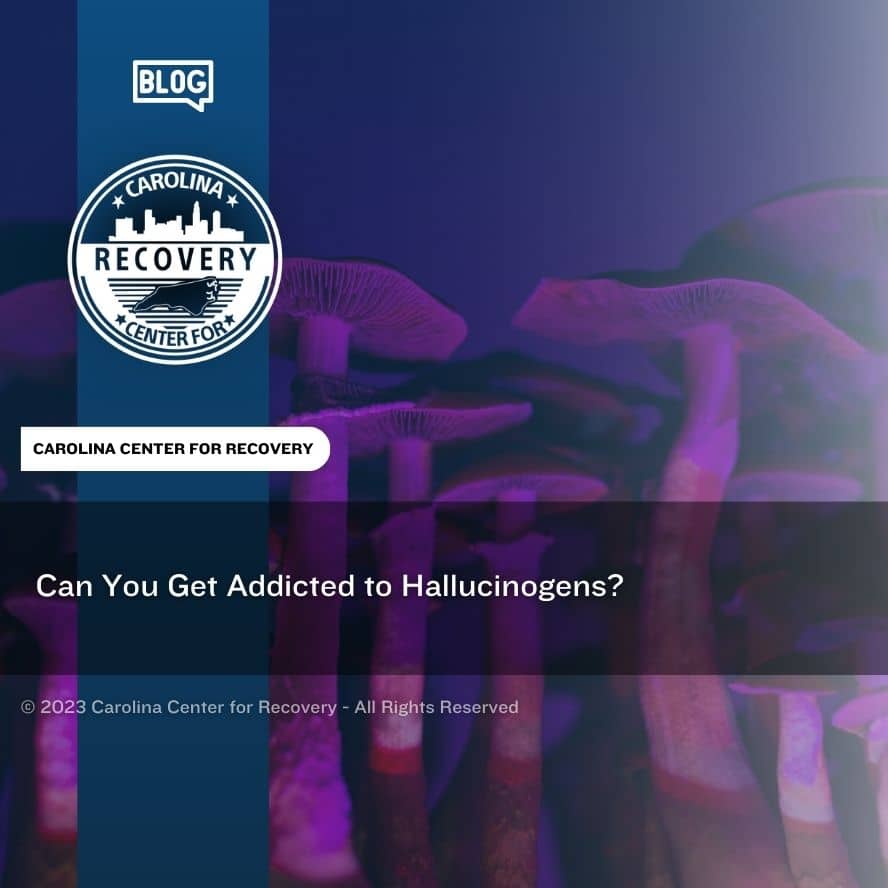Can You Get Addicted to Hallucinogens?

Medically Verified: 2/1/24
Medical Reviewer
Chief Editor

All of the information on this page has been reviewed and verified by a certified addiction professional.
Hallucinogens are a type of substance that can change how your brain works. People who use hallucinogens may experience hallucinations or sensations that they like. These pleasant effects may make people want to take hallucinogens more often.
Some people may wonder if it’s possible to become addicted to hallucinogens. Medical experts believe that hallucinogenic drugs are generally not addictive. However, the National Institute on Drug Abuse advises that taking high doses of certain types of hallucinogens can be very dangerous.
This article will explore whether or not hallucinogen addiction can occur. You will also learn the risks and side effects of psychedelic drugs and how to find treatment for hallucinogen abuse.
Reach out to the Carolina Center for Recovery team now to learn about our substance use disorder (SUD) treatment programs. You may also schedule an intake, check your insurance details, or ask questions.
What are Hallucinogens?
Hallucinogens (psychedelics) are a type of drug that changes how people perceive their surroundings. Some of these drugs, like magic mushrooms, come from natural sources. Certain fungi and mushrooms have psychedelic chemicals. Other hallucinogens are synthetic (artificial).
Common hallucinogens include:
- Lysergic acid diethylamide (LSD/acid)
- Psilocybin (magic mushrooms)
- Peyote
- Ketamine
- Salvia
- DMT
- PCP (angel dust)
Hallucinogens temporarily alter your thoughts and perceptions. People who use hallucinogens may see and hear things that aren’t real (hallucinations). These hallucinations can feel very real and may be intense.
Some people experience terrifying hallucinations at times. In other cases, hallucinations may be very pleasant or feel spiritually significant.
Hallucinogens can also cause users to feel out of control. They may feel disconnected from reality or experience altered time.
People refer to being under the influence of hallucinogens as “tripping.” People may have good trips or bad trips. During a good trip, people feel content and at peace. During a bad trip, people may feel disturbed, agitated, or out of control.
As hallucinogen use increases throughout the United States, it is more important than ever to understand the short and long-term effects and risks of these drugs.
Why Do People Use Hallucinogens?
In recent years, a small number of states have passed legislation to decriminalize or legalize hallucinogens for medical or recreational use. Some of the uses for hallucinogens include:
- Recreational use for their pleasant effects
- Reducing depression and anxiety
- Supporting abstinence from alcohol and smoking
Wider acceptance of hallucinogen use may make people not understand the risks of these drugs. It’s essential to know how these drugs work and the potential for long-term harm before using them.
Are Hallucinogens Addictive?
Mental health and medical experts have conducted research to determine if hallucinogenic drugs are addictive. Generally, research shows that using psychedelics does not lead to physical dependence or addiction.
However, some people may develop psychological dependence or tolerance to some hallucinogens. The National Institute on Drug Abuse (NIDA) concludes that repeated LSD use may cause tolerance.
Tolerance occurs when your body adjusts to a certain amount of a substance. People with LSD tolerance may need to use larger doses to get the effects they want. People who become tolerant to LSD may also have tolerance to other psychedelics, including magic mushrooms.
The Effects and Risks of Hallucinogens
All drugs can cause side effects and have risks. Here is an overview of the side effects and dangers of hallucinogenic drugs.
The effects of hallucinogens
People may experience short-term side effects while using hallucinogens. These include:
- Elevated heart rate
- Nausea
- Sensory changes, such as hearing sounds or seeing colors differently
- Altered sense of time, such as feeling like time is going by slowly
People may have long-term effects of hallucinogen abuse, including:
- Paranoia
- Confusion and disorganized thinking
- Mood changes
- Visual disturbances
People may be bothered by these side effects. Some side effects may last for a long time after you stop using psychedelics.
Bad trips
People may experience “bad trips” while using hallucinogens. This can include:
- Intense fear
- Panic
- Scary hallucinations
- Disturbing thoughts
- Increased awareness of your bodily processes
People may have impaired judgment during a bad trip. They may act out their hallucinations or have exaggerated beliefs about their abilities. People may sustain injuries or die by jumping from high places, drowning, or other risky behaviors while under the influence of psychedelics.
People with mental health issues may be more likely to have bad trips. However, anyone can experience a bad trip, even if they do not have pre-existing mental health conditions.
Hallucinogen persisting perception disorder
Some people may have long-lasting effects of psychedelic abuse. This is called hallucinogen persisting perception disorder.
Classic hallucinogen persisting perception disorder (HPPD) symptoms include anxiety and flashbacks to a bad trip. People with HPPD may have significant distress and impaired functioning.
Find Treatment for Hallucinogen Abuse
If you or someone you love struggles with hallucinogen abuse, substance abuse treatment can help. Contact the Carolina Center for Recovery specialists to explore your treatment options or set up an intake assessment.

